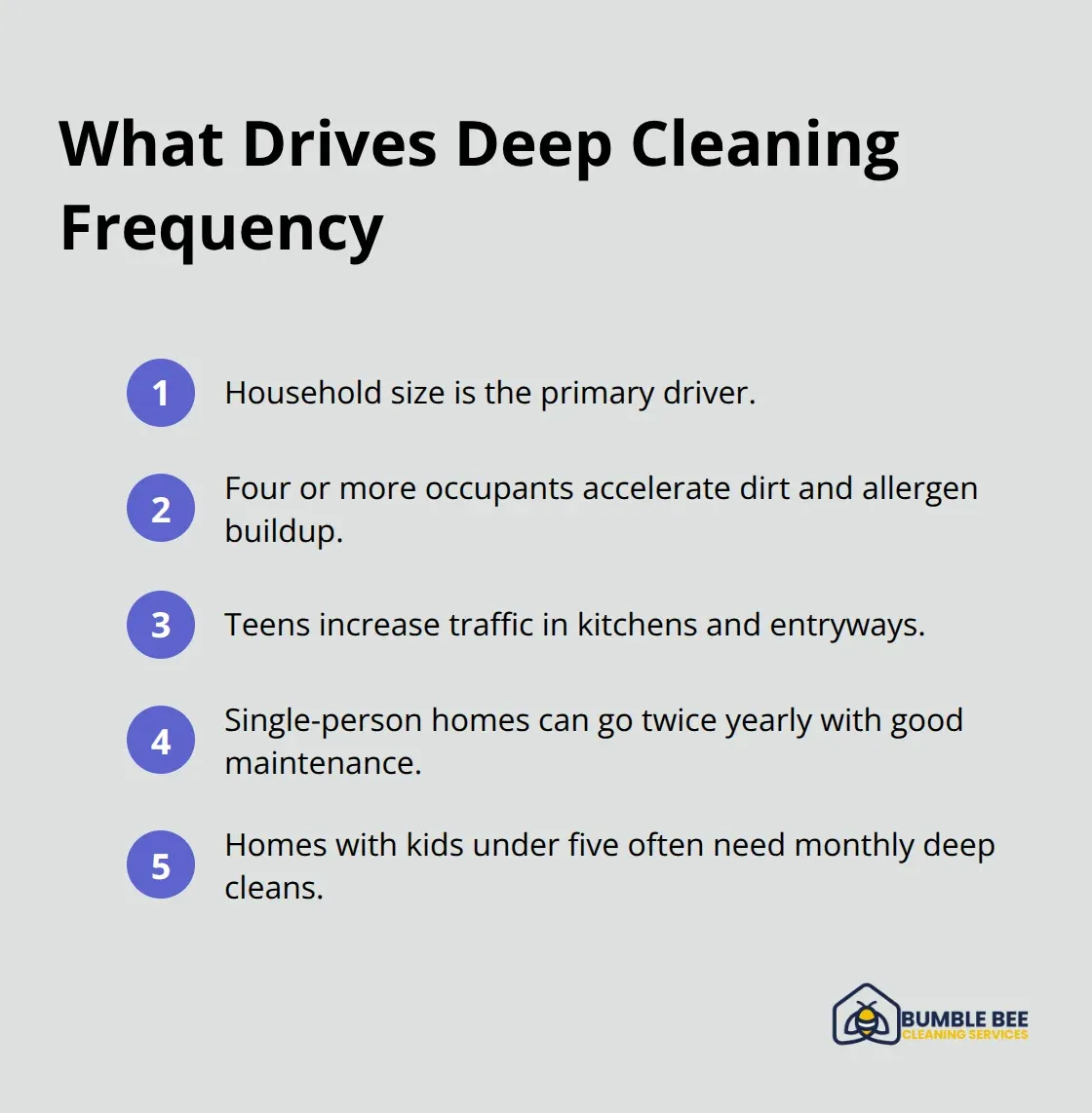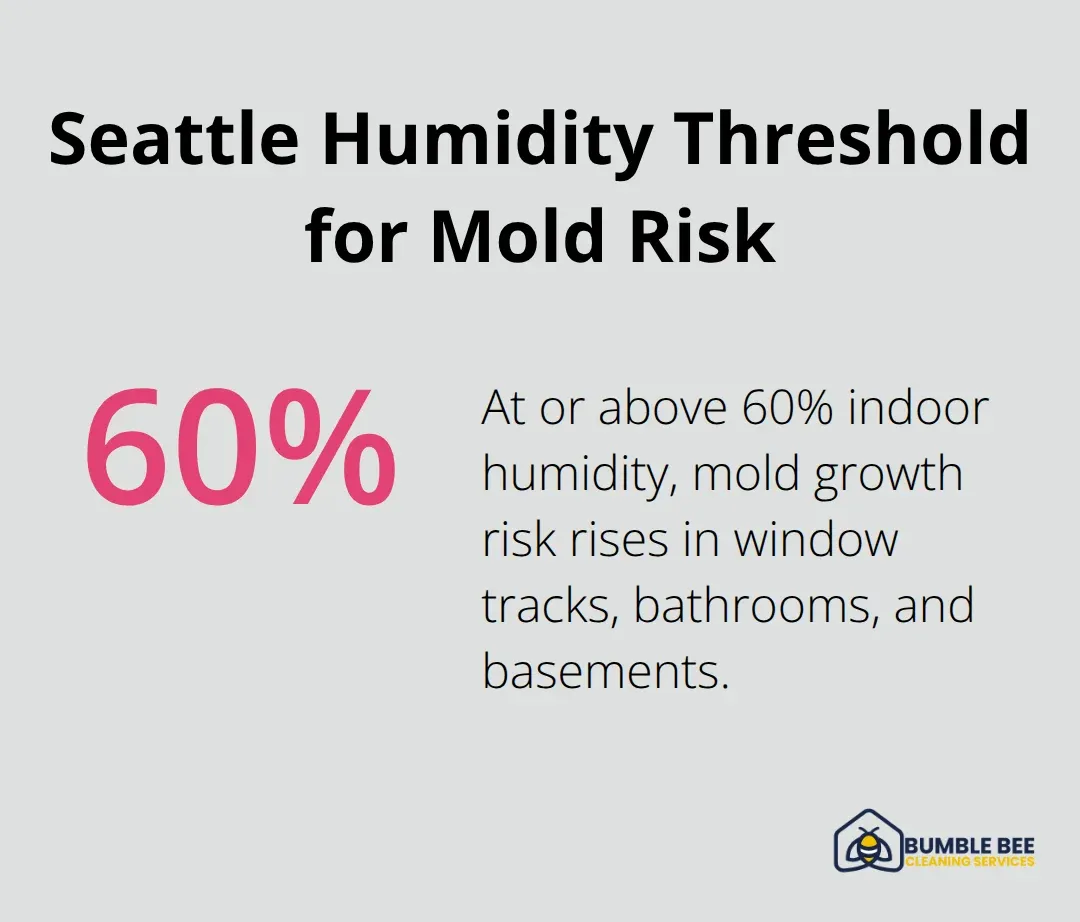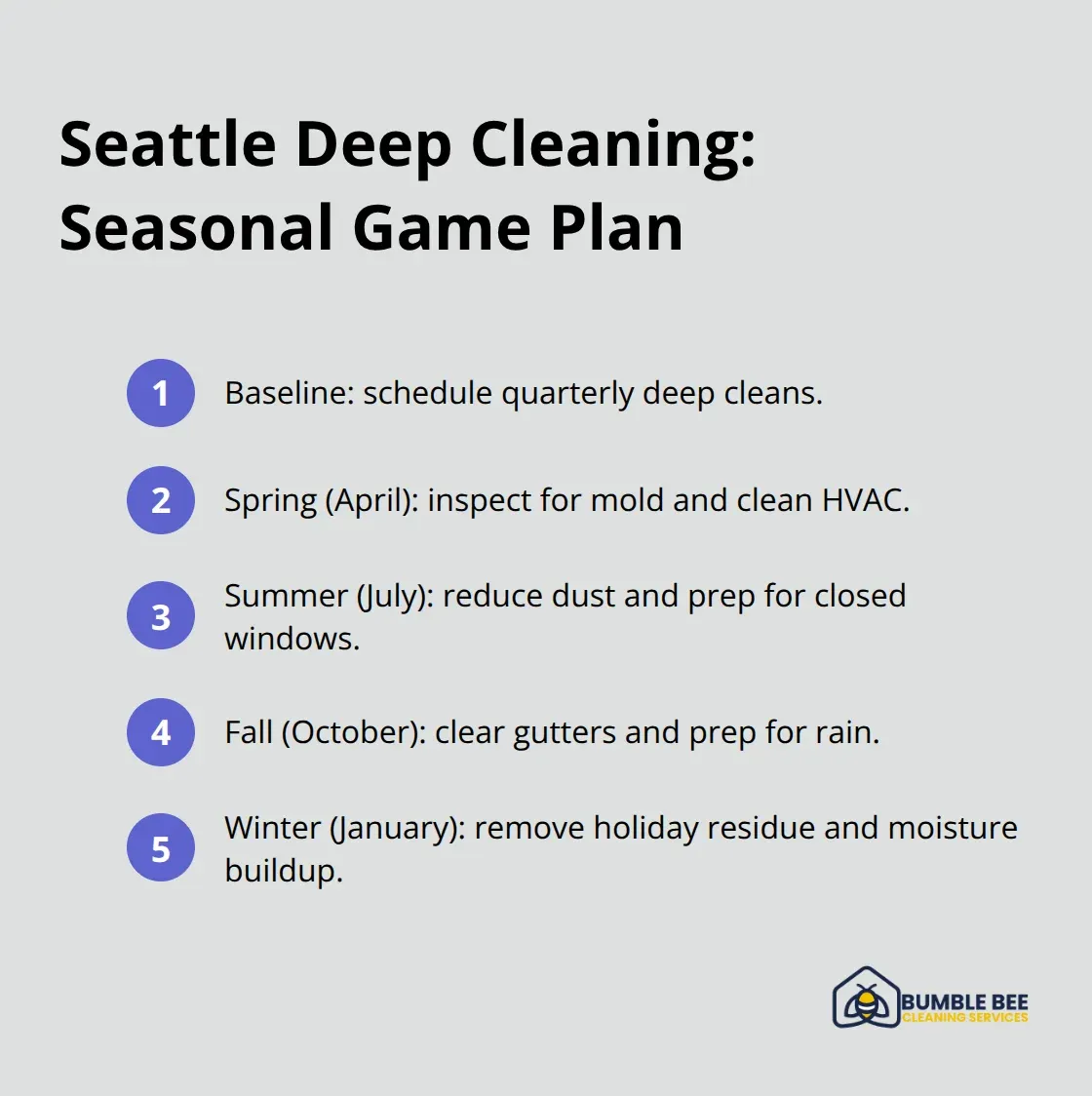Seattle’s unique climate creates specific cleaning challenges that many homeowners underestimate. Rain, humidity, and seasonal allergens build up faster than in drier climates.
We at Bumble Bee Cleaning Services see how deep clean frequency directly impacts indoor air quality and home maintenance costs. Most Seattle residents wait too long between deep cleans, leading to bigger problems later.
What Makes Deep Cleaning Different From Regular Cleaning
Deep cleaning tackles areas your weekly routine never touches. While regular cleaning covers visible surfaces like countertops and floors, deep cleaning reaches baseboards, window tracks, inside appliances, and under furniture where allergens accumulate. The Seattle Department of Health specifically recommends monthly mold inspections because our climate creates conditions where surface cleaning simply won’t work. Deep cleaning includes scrubbed grout, cleaned light fixtures, washed walls, and sanitized areas that harbor bacteria and mold spores.
Time Investment Differences
Regular cleaning takes 1-2 hours weekly for most Seattle homes. Deep cleaning requires 6-12 hours (depending on home size and condition). The Asthma and Allergy Foundation of America notes that homes with pets need bi-weekly thorough cleanings, which means more frequent deep cleaning sessions. Most homeowners spend 15 minutes daily on maintenance cleaning, but deep cleaning demands concentrated effort over entire days or multiple sessions.
Cost Analysis Shows Long-Term Savings
Professional deep cleaning costs $200-600 per session versus $80-150 for regular cleaning. However, skipped deep cleans create expensive problems. Mold remediation averages $3,000-8,000 when moisture issues go unaddressed. Carpet replacement costs $1,500-4,000 when allergens and dirt damage fibers permanently. IICRC Standards are internationally recognized guidelines that define best practices for cleaning and restoration work, extending carpet life by 3-5 years. Regular deep cleaning prevents these major expenses while it maintains indoor air quality that reduces allergens in your home.
Seattle-Specific Cleaning Challenges
Seattle’s climate creates unique problems that standard cleaning can’t address. Moisture builds up in hidden areas where weekly cleaning never reaches. Window tracks collect more debris during our rainy months (October through March), and baseboards trap moisture that leads to mold growth. These factors make deep cleaning frequency more important for Seattle homeowners than residents in drier climates.
What Factors Affect Your Deep Cleaning Schedule
Household size determines deep cleaning frequency more than any other factor. Homes with four or more occupants accumulate dirt and allergens faster than smaller households according to industry data. Each additional person adds cooking residue, tracked-in debris, and bathroom usage that standard cleaning can’t address. Seattle families with teenagers need quarterly deep cleaning because high-traffic areas like entryways and kitchens collect moisture and grime that weekly cleaning misses.

Single-person households can extend deep cleaning intervals to twice yearly, but homes with children under five require monthly attention due to spills, sticky surfaces, and toy contamination that harbors bacteria.
Pet Ownership Changes Everything
Pet-owning households need deep cleaning every six weeks minimum. The Asthma and Allergy Foundation of America found that pet dander accumulates in carpet fibers, upholstery, and air ducts where regular vacuuming can’t reach. Dogs track in more outdoor contaminants during Seattle’s rainy season, while cats create litter dust that settles in baseboards and under furniture. Homes with multiple pets or large breeds require monthly deep cleaning to prevent odor buildup and allergen concentration that affects indoor air quality.
Seattle’s Climate Creates Unique Challenges
Seattle’s climate creates moisture problems that accelerate deep cleaning needs. Humidity levels above 60% promote mold growth in areas like window tracks, bathroom corners, and basement spaces that surface cleaning never addresses.

Homes without proper ventilation need deep cleaning every eight weeks during rainy months (October through March) versus quarterly during drier periods. Houses built before 1990 typically lack adequate moisture barriers, which requires more aggressive cleaning schedules to prevent mold and mildew accumulation that regular maintenance can’t control.
Lifestyle Factors Impact Frequency
Busy households that host frequent gatherings need more intensive cleaning schedules. Homes where occupants work from home accumulate dust and debris faster in office spaces and common areas. Families who cook elaborate meals daily create grease buildup in kitchens that standard weekly cleaning can’t eliminate. These lifestyle patterns directly influence how often your home needs professional attention to maintain healthy indoor conditions and prevent long-term damage to surfaces and air quality systems.
What Deep Cleaning Schedule Works Best in Seattle
Seattle homeowners need quarterly deep cleaning as the baseline, with seasonal adjustments for Pacific Northwest weather patterns. Spring deep cleaning should happen in April after winter moisture damage assessment and focus on mold inspection and HVAC system cleaning. Summer sessions in July target dust accumulation and prepare homes for closed-window months ahead. Fall cleaning in October addresses gutter debris and moisture preparation before rainy season begins.

Winter deep cleaning in January tackles holiday residue and moisture buildup from increased indoor time.
Monthly Deep Cleaning for High-Risk Homes
Homes with four or more occupants, multiple pets, or poor ventilation systems need monthly deep cleaning during Seattle’s wet season (October through March). Monthly schedules work best for houses built before 1990, basement-level spaces, and homes with family members who have respiratory conditions. Single-person households or couples without pets can extend to quarterly schedules, but only if they maintain weekly HEPA filter vacuuming and moisture control measures.
Seasonal Adjustments for Pacific Northwest Weather
Seattle’s rainy season demands more aggressive cleaning schedules than summer months. Homes need bi-monthly attention from October through March when moisture levels peak and windows stay closed. Spring cleaning should address winter damage and prepare ventilation systems for warmer weather. Summer allows extended intervals between deep cleans, but dust control becomes the primary focus. Fall preparation prevents moisture damage during the upcoming wet season.
Warning Signs That Demand Immediate Deep Cleaning
Musty odors indicate mold growth that surface cleaning cannot address. Visible dust accumulation on ceiling fans or light fixtures means airborne particles have settled throughout hidden areas. Allergy symptoms that worsen indoors signal allergen buildup in carpets, upholstery, and air ducts that regular cleaning misses. Water stains on walls or ceilings require immediate deep cleaning to prevent structural damage and health hazards. Pet odors that persist after regular cleaning indicate bacterial growth in porous surfaces that need professional attention.
Final Thoughts
Seattle homeowners should schedule quarterly deep clean sessions as their baseline, with monthly appointments during the wet season for homes with pets, large families, or poor ventilation. Deep clean frequency depends on household size, pet ownership, and Seattle’s moisture-heavy climate that creates unique challenges regular maintenance cannot address. This schedule prevents expensive problems while it maintains healthy indoor air quality year-round.
Consistent deep clean schedules prevent expensive problems like mold remediation and carpet replacement while they maintain healthy indoor air quality. Homes that skip deep clean sessions face $3,000-8,000 in mold damage costs and premature replacement of furnishings (particularly carpets and upholstery). Regular professional attention extends carpet life by 3-5 years and reduces allergen buildup that affects family health.
We at Bumble Bee Cleaning Services understand Seattle’s specific challenges after years of experience with local homeowners. Our team provides comprehensive residential cleaning solutions with eco-friendly products and flat-rate pricing. Professional services handle hard-to-reach areas, use specialized equipment, and maintain consistent schedules that busy homeowners struggle to manage alone.
